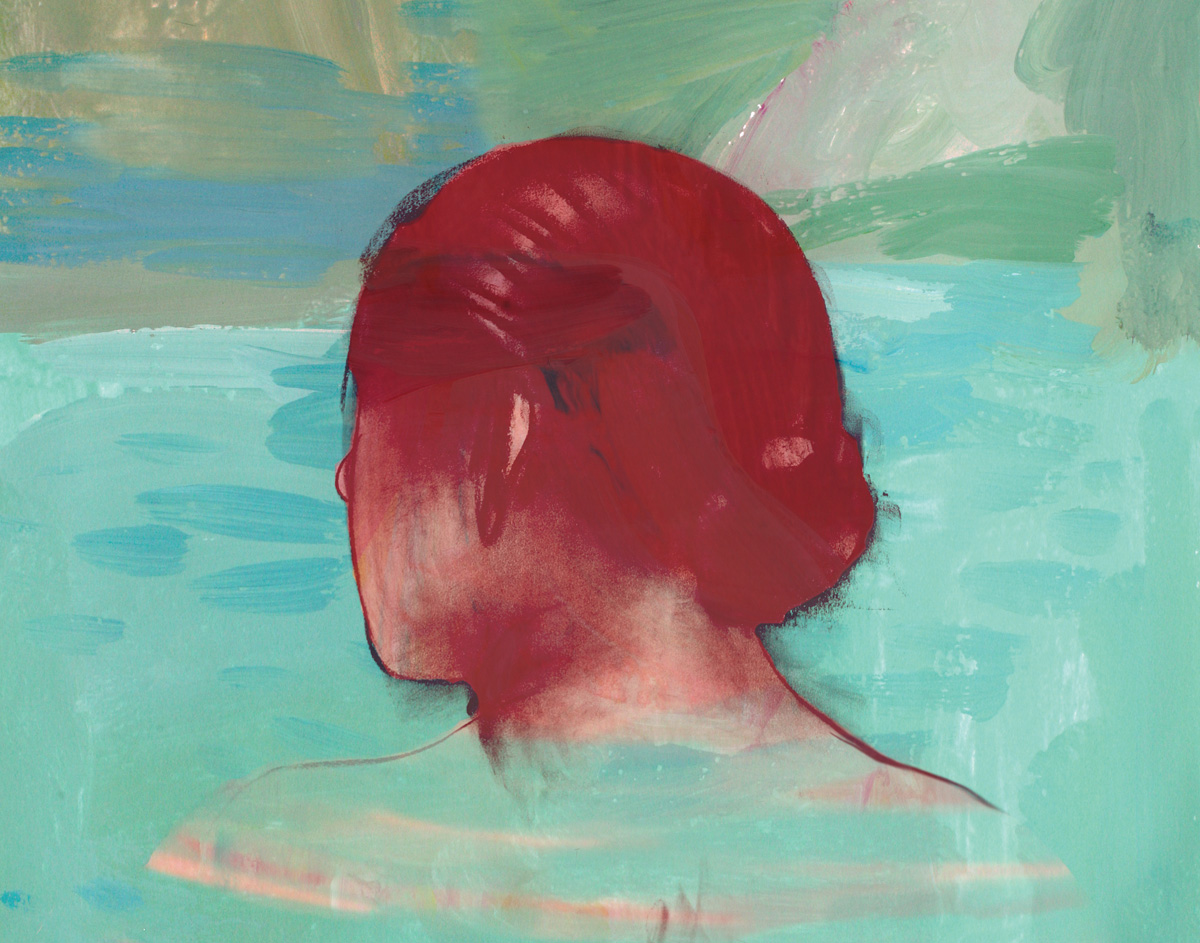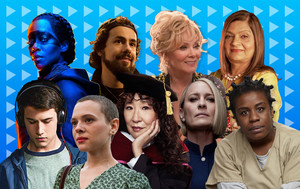
The odd thing was he hadn’t moved since last night. That’s what I was thinking about, and also the prices on the menu: $14.50 for goat cheese pancakes, $18 for a crab omelet. This restaurant was famous for its brunches. Steven and I decided to try it out today since we’d passed it, longingly, on so many other occasions. One last hurrah before my water broke. We murmured to each other that we deserved it. We never ate at places like this while I was pregnant, or even before, and once the baby was born we wouldn’t again.
“So what I’m thinking is I’d love a mimosa,” I said, but what I was really thinking was that I’d love a stiff martini, and then another.
“So order one.”
Steven had been great throughout the pregnancy, typically great, never barking at me for drinking coffee or going jogging or worrying every so often that I looked fat — not pregnant fat, but fat-person fat. Never once did he tell me I was being selfish or ridiculous or, God forbid, that I was glowing. He massaged my preposterous size-10 feet. “The doctor said a glass every so often is fine, right? Especially toward the end?”
“They’re 12 dollars,” I pointed out.
“We’re celebrating,” Steven said, and reached out and held my hand. We’d been making ourselves celebrate, anticipate, act like other expectant parents in a million ways. Just two days earlier, we’d bought a car seat and a bottle warmer and three organic cotton onesies.
I attempted to make eye contact with the waitress.
“Come on,” he said. “Fake it for me.”
“I’m not faking anything,” I said, my eyes scanning the big, empty room.
When we found out I was finally pregnant, we speculated: Steven’s blue eyes or my perfect vision? His full, Russian mouth or my loose, jazzy singing voice? Or maybe my hair (thick and curly) and his patience (endless, endless). We’d sat on the couch with the pink stick and gazed serenely at it. For some reason I had assumed it was a girl.
I think, deep down, we’d always wanted children, although when we were in our late 20s, newlyweds, we told ourselves that between the melting ice caps and the surging terrorists, it was downright irresponsible to bring a child into the world. Besides, we liked to sleep ’til noon and spend all of our money on concert tickets — a Hall & Oates reunion, Lollapalooza — so what kind of parents would childish people like us be? Still, predictably — my mother, my sister, my cousins all called it — by the time I celebrated my 31st birthday, biology had me in a choke hold. I drank too much chardonnay that night and announced to Steven it was time. He pushed my hair out of my eyes. Really? He was delighted. I nodded, dribblingly, and we made love right there on our floor. And then I closed my eyes and prayed to every god I knew that I hadn’t made an enormous mistake. When I finally got my period, I thanked Allah, Vishnu, Christ.
But that was four years ago, and we’re wiser now. We planned to have this baby, we’d done everything right: Steven found clients he could count on, and I’d landed a high school job with tenure. We’d bought a house near the big town park; we’d traded in our rambunctious house cats for a parakeet. We wanted this baby so badly. It took us so many months to get pregnant.
“You feeling OK?”
“I’m feeling great,” I said. And I was, more or less.
“You look beautiful,” Steven said.
“Don’t.”
He shrugged his shoulders, looked out the window.
“So have you two decided?” asked our waitress, who had caught my eye and drifted over from an early morning flirtation with the bartender.
“We have,” said my husband. He was still covering my hand with his own. The restaurant was all glass windows looking out on Barnes Street, five blocks from the three-bedroom house we’d bought with 20 percent down and the next 30 years of our lives.
“Well, before you tell me, let me recommend the asparagus frittata,” our waitress said. “It’s awesome.” Awesome? She was an actress type: liquid eyes, bed-tossed hair. She took out her pad, then looked at me and gasped theatrically. “My goodness!”
I gave her the most patient smile I had left. “I’m due on Thursday.”
“Wow! That’s so great!”
“Yes,” I said. “I’ll have a mimosa,” I said. We couldn’t afford a mimosa. Her eyes grew wider.
“The doctor said it’s fine,” Steven said, winking at me.
“Well, if the doctor says so,” the waitress said, modulating her voice as though she were talking to a child. This, too, was nothing new. My ninth-graders felt protective of me, worked a little harder for me, did their best not to make my job too difficult. Jason Rollins erased my blackboards; Maria Garces lifted my heavy books.
“And I guess I’ll have the eggs Benedict.”
“Oh, no,” the waitress said to me, sternly. “There’s raw eggs in that. The hollandaise.” She paused. “But we could do it without the hollandaise.”
What I wanted to say was, lady, the hollandaise is the least of this kid’s worries. Instead, I smiled and rubbed my stomach. I’d be sorry when I didn’t have my stomach anymore. I’d just started to enjoy resting my arms on it.
“And what about you, sir?”
Steven ordered the root-vegetable hash with the runny eggs on top. Raw eggs weren’t his problem, nor mine, really. They were Buster’s, but if they bothered him, he’d never say a word.
The waitress left. I heard her call to the bartender, “You should see her, she’s ready to pop.”
And then silence. Multiculti music on the stereo, but the kind that’s so ubiquitous you can barely hear it: wind flutes, El Cóndor Pasa. For our honeymoon, six years, three months, two weeks ago, we hiked in the Andes, in Peru. We slept on the trail from Cuzco to Machu Picchu, and cooked potatoes and eggs on a camp stove, and drank the local liquor, damn the altitude. We did our best to kid around with the Peruvian tour guides, but they were not the kidding types. We drank beer in Aguas Calientes, which means hot waters — it’s the town at the base of Machu Picchu. Aguas Calientes is named for the hot springs, and we went soaking in that warm, bubbling water every afternoon.
And why are you here? the nice woman asked me in Peruvian-accented English on our final afternoon in town. I was leaning against the tile wall of one of the soaking pools, watching the clouds coalesce in the sky, breathing in the fumes from the sulphuric water. Steven was sprawled along the bench on the other side of the pool.
Luna de miel, I said to the woman, which was one of three Spanish phrases I knew. She had a reddish wrinkled face and long gray hair. She wore a purple flowered bathing suit.
A honeymoon! she said. Congratulations.
We sat next to each other quietly then, her closing her eyes, me stretching out my legs in the grayish water. I think Steven might have been asleep.
And when you will have children? she asked.
I don’t know, I said, thinking, oh these foreigners, and their touchingly foreign sense of what’s appropriate to ask another person.
Steven was either sleeping or he wasn’t, but either way he wasn’t listening, all blissed-out and lightheaded in the stinky water, so I felt safe saying: We might not have any children at all. We’re both really into our work.
She went quiet again, and maybe we both sort of dozed, but then the sun came out of the clouds and we started talking again. The conversation veered to this and that: her work at a local hotel, the tourists who come to this part of the Andes, our luck with the weather. She liked Aguas Calientes, she said, even though it was a make-believe town, a tourist construction, and a tourist trap. I told her I liked it, too.
Best wishes, she said to me, when I got out of the pool. Good luck to you both. She shaded her eyes against the sun. May you have a very happy life together. And children.
Oh, I said, well, thank you. A little bit grateful for her wishes, but a little bit snarky, too: Thank you, I said, and as for the children, I guess time will tell.
It was fun back then to be cavalier.
The mimosa arrived in a sparkling glass with a blue rim. The pooling light shined through it and left a church-window pattern on the table. If I went much past Thursday, they would induce. I was supposed to be monitoring his movement all the time, every hour, and go to the hospital immediately if anything seemed off.
“He’ll be incredible, you know,” Steven said, after a long time of not saying anything.
“After a fashion.”
“No,” Steven said. “Just incredible.”
His blue eyes. My singing voice. I had said to Steven, weakly, after we found out, that we didn’t have to do this. But, you know. The look on my husband’s face.
“I can’t wait to meet him,” Steven said.
“I know.”
We’d planned to name him William but already we called him Buster, which is what we used to call the fatter and wilier of our two house cats. The smarter one. Before we gave him away, Buster used to paw open our sock drawer and curl up inside and take his naps there. He’d fill up the sock drawer with his bulk. Our new Buster would never have bulk. Our new Buster would never be smart. But still there were similarities between the two of them: As though he were a house cat, we might have to put this Buster in another’s care after Steven and I could no longer do the job, after we were too exhausted or too old or dead. Not even the best doctors could predict what would happen. He could go either way, they told us. Almost normal, even. Or maybe he would never learn to say his own name.
I drained my mimosa. Residential programs in our area cost $45,000 a year, and there was always a chance we’d need to find one by the time he was an adolescent. That afternoon I was supposed to go online, research ways to finagle Medicaid.
“He’ll be incredible,” Steven said. “Like you. Is he kicking?”
The odd thing was he hadn’t moved since last night.
“Oh, yes,” I said. I fiddled with my empty glass, moved it around in the pool of light on the table. “Oh, yes,” I said. “I can feel him,” I said. “There he goes.”


